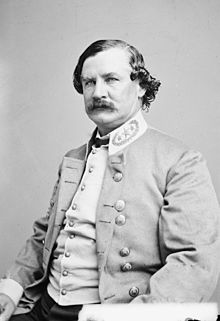Benjamin F. Cheatham
|
Major-General Benjamin Franklin Cheatham |
|
|---|---|

General Cheatham during the Civil War
|
|
| Born |
October 20, 1820 Nashville, Tennessee |
| Died | September 4, 1886 (aged 65) Nashville, Tennessee |
| Place of burial | Mount Olivet Cemetery, Nashville, Tennessee |
| Allegiance |
|
| Service/branch |
|
| Years of service | 1846–1848 (USA) 1861–1865 (CSA) |
| Rank |
|
| Battles/wars | |
Mexican–American War
American Civil War
Benjamin Franklin "Frank" Cheatham (October 20, 1820 – September 4, 1886) was a Tennessee planter, California gold miner, and a general in the Confederate States Army during the American Civil War. He served in the Army of Tennessee, inflicting many casualties on Sherman at Kennesaw Mountain, but taking the blame for General Schofield's escape at Spring Hill, a major factor in the Confederate defeat at Franklin.
Cheatham was born in Nashville, Tennessee on a plantation called Westover, which in its prime consisted of three thousand acres (12 km²). He was born into two of the finest and prominent families of the middle Tennessee elite of the slave society. His mother was descended from General James Robertson, the founder of Nashville and "father" of Middle Tennessee, who came from Virginia. The Cheathams had been in middle Tennessee for two generations and become established as plantation owners, lawyers, doctors and mayors of the city.
At the start of the Mexican–American War, Cheatham joined the 1st Tennessee Infantry Regiment as a captain and finished the war having been promoted to Colonel of the 3rd Tennessee. He moved to California in 1849 for the Gold Rush, but returned to Tennessee in 1853.
He managed his plantation and served as a brigadier general in the Tennessee Militia.
Cheatham joined the Confederate States Army as a brigadier general on May 9, 1861, and became a brigade commander in the Western District of Department Number Two, under Maj. Gen. Leonidas Polk. His first test in the war was in Missouri on November 7 at the Battle of Belmont, leading three regiments in Brig. Gen. Gideon J. Pillow's division against Union Brig. Gen. Ulysses S. Grant, also in his first Civil War combat. In December, Cheatham and his division received the Thanks of Congress, "for the desperate courage they exhibited in sustaining for several hours, and under most disadvantageous circumstances an attack by a force of the enemy greatly superior to their own, both in numbers and appointments; and for the skill and gallantry by which they converted what at first threatened so much disaster, into a triumphant victory."
...
Wikipedia
